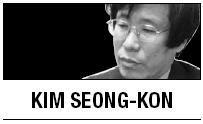 Once again, South Korea puzzled the world. Despite the unprecedented crisis recently provoked by the North Korean attack on the naval ship Cheonan, half of South Korea turned their backs on the ruling Grand National Party and voted for the pro-North Korean Democratic Party. Foreigners who are accustomed to logical explanations perhaps will never understand this unfathomable contradiction.
Once again, South Korea puzzled the world. Despite the unprecedented crisis recently provoked by the North Korean attack on the naval ship Cheonan, half of South Korea turned their backs on the ruling Grand National Party and voted for the pro-North Korean Democratic Party. Foreigners who are accustomed to logical explanations perhaps will never understand this unfathomable contradiction. Nevertheless, there are reasons that are uniquely Korean. First of all, Koreans have a strong desire for equilibrium and thus are always looking to disperse power. Consequently, they always cripple their central government by customarily voting for the opposition party in the elections for lawmakers or local government leaders. Secondly, the Korean people are fed up with the arrogance, stubbornness and internal brawls of the ruling GNP, which is sharply divided by the pro-Lee faction and the pro-Park clan. The GNP members seem to have completely forgotten that the Korean people voted the GNP into power not necessarily because they were attractive, but because they looked better than the faltering Roh administration.
The most decisive factor that led to the defeat of the GNP in the recent elections is the younger generation’s support for the opposition Democratic Party. Today, young people in South Korea fantasize about rudimentary Marxism and progressivism. Influenced by the radical teachers and Marxist books rampant in our society, a majority of young people in Korea naively develop hostility towards capitalism/neo-liberalism and admire Marxism/socialism instead without fully understanding its meaning. Brainwashed by leftist politicians for the past decade, they believe unification is imminent and that the only obstacles to a unified peninsula are stubborn anti-communist conservatives and the U.S. military forces deployed in South Korea. These young people even do not believe that the Cheonan warship was capsized by a North Korean torpedo.
Of course, you cannot expect young people to be conservative; it is in their blood to be liberal and progressive. Young men and women usually do not want to be labeled as conservative and thus are readily available to uphold leftist ideology in any country. Besides, it is expected that college students function as defiant critics of the government, revolting against the establishment and social institutions.
In South Korea, however, such a social phenomenon can eventually cause serious problems. One problem is that young people in South Korea are likely to unwittingly become what Lenin calls, “useful idiots.” Indeed, we often seem to forget the fact that we confront a hostile communist nation to the immediate north of our capital city. Under the precarious circumstances, it may be dangerous that our young people have admiration for socialism, Marxism or North Korea, no matter how vague the admiration. The older generation that witnessed the atrocities of the Korean War will die out soon. Then our young people’s naïve fantasy of Marxism and North Korea may seriously endanger the national security of South Korea. Yet in today’s South Korea it has become fashionable to be a progressive, i.e. a leftist and young Koreans are naively attracted to all kinds of flashy formulations of leftist ideologies.
The other day I attended the presentation of a fresh Ph.D. who applied for an opening in my department at Seoul National University. I was appalled when the young man stoutly asserted, “We should spread the powerful Marxist approach to literature in academia.” Recently, I interviewed two applicants who wanted to be hired as editors at the Seoul National University Press. They were asked to write an essay on the possible impact of a political incident like the Cheonan warship tragedy on the publishing business.
One of them wrote: “How could a North Korean submarine possibly approach the Cheonan warship during South Korea and America’s joint military operation? Why did the government announce the outcome of the investigation right before the elections? American neo-liberalism is stifling us. Our only hope exists with the left.” Another applicant wrote: “Listening to the government’s announcement, we knew that the belligerent conservatives are determined to unify the Korean peninsula by military muscle. Beside those who courageously raised their voice of protest against the government, we ordinary citizens are seized by fear of war.” Instead of writing on how to publish books, both of them wrote a pro-North Korean political manifesto. At that moment, I could foresee the outcome of the upcoming elections.
Politically speaking, South Korea is currently enflamed with a silent civil war that is tearing up the nation with ideological clashes and confrontations. Perhaps many young Koreans feared the possibility of war and thus voted for the opposition party in the last week’s elections. The problem is that the outcome of the elections may give the wrong impression that South Koreans approved of North Korea’s torpedo attack on the warship Cheonan, desecrating the 46 sailors who sacrificed their precious lives for the country.
In the recent elections, we may have won the battle for regional conflicts of interest such as the Sejong City project. In the international community, however, we lost so many precious things such as our identity, credibility and unity in times of crisis.









![[Hello India] Hyundai Motor vows to boost 'clean mobility' in India](http://res.heraldm.com/phpwas/restmb_idxmake.php?idx=644&simg=/content/image/2024/04/25/20240425050672_0.jpg&u=)









